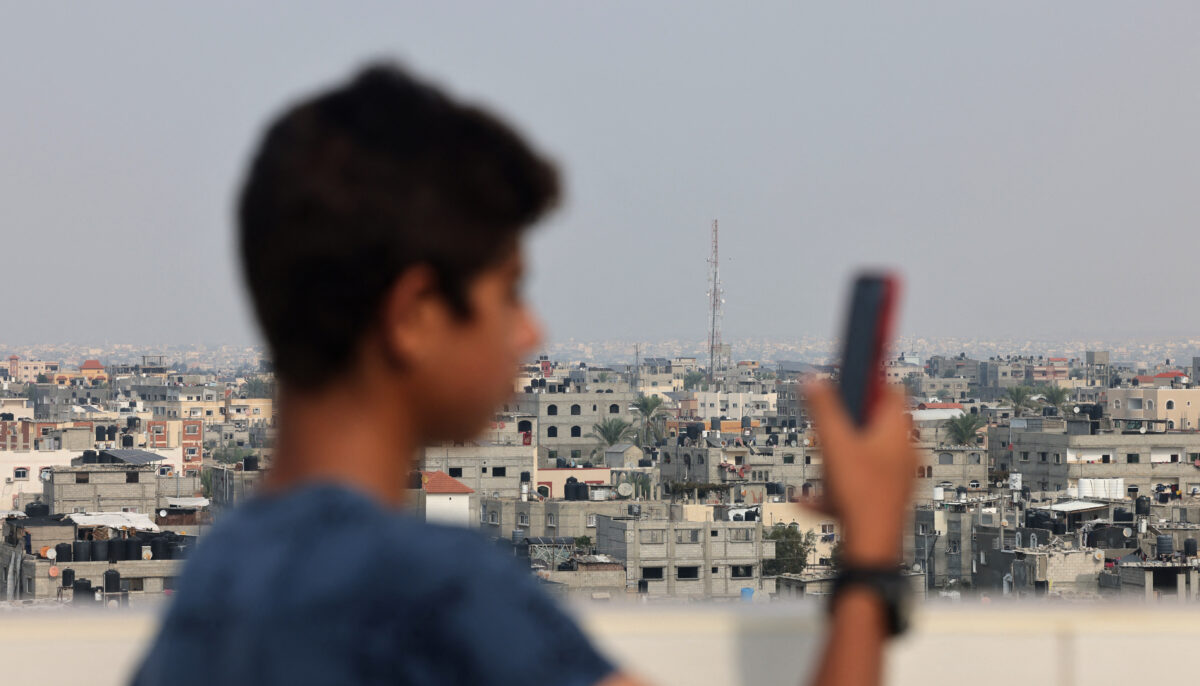“Recent airstrikes amidst relentless aggression have severely damaged the last-standing international routes connecting Gaza to the outside world, in addition to the already-destroyed routes during earlier attacks. This led to a total communications blackout in the beloved Gaza Strip,” the Palestinian Telecommunications Company “Paltel” announced before shutting down its internet services on October 27.
On November 1, which marked day 26 of consecutive and indiscriminate airstrikes by the Israeli occupation, telecommunications were once again severed in Gaza.
Just days after October 7, when Israel declared war on Gaza, communications networks and internet services were consistently targeted and disrupted by ongoing Israeli bombardment. Over 9,770 civilians have been killed by Israeli airstrikes so far, including 4,008 children.
The Israeli occupation forces deliberately target telecommunications infrastructure within Gaza to conceal their war crimes and isolate Gaza’s residents from each other and the rest of the world. Field journalists reported through their personal social media accounts how, during network outages, residents were unable to call ambulances, connect with each other for safety check-ins, request information, or stay updated on the latest developments.
On October 27, Jagan Chapagain, the Secretary-General of the International Federation of Red Cross and Red Crescent Societies (IFRC), expressed via Twitter his deep concern about the blackout’s impact on contacting teams in Gaza, which in turn jeopardized the Palestine Red Cross’s capacity to provide crucial emergency medical services.
Last Saturday, the Israeli occupation army issued a call for the immediate evacuation of residents in the northern Gaza area and Gaza City, signaling their intent to broaden the scope of the ground military operation. However, when this warning was issued on October 28, internet connectivity had plummeted to its lowest levels since the beginning of the aggression. With the internet down, many people confirmed that they did not receive the warning in time. The message was also sent in English rather than Arabic.
Difficulties in Accessing the Internet Even Before the War Began
Internet access in the Gaza Strip was already compromised prior to the outbreak of the war. People primarily relied on fixed-line internet, such as local Wi-Fi networks, as the Israeli occupation authorities prohibited developing second-generation (2G) networks into third-generation (3G) networks in the strip.
“Mobile internet services are nearly non-existent within the Palestinian network infrastructure in Gaza because they are not permitted to operate without second-generation (2G) communication network technology. Third-generation (3G) networks are only available in certain areas of the West Bank,” Hanna Kreitem, senior advisor at the Internet Community Association in the Middle East, told SMEX.
Kreitem explained that residents could access the internet by utilizing the “Data Roaming” feature and connecting to Israeli networks using SIM cards like “e-SIM,” which is a standard digital chip that enables package activation with a telecommunications company without requiring a physical SIM card. Kreitem added that these lines are limited and not widespread in the Gaza Strip, as they need to be registered abroad.
Lack of Equipment and Conflicting Narratives
Kreitem also confirmed that in addition to bombs destroying the cables supplying Gaza with internet, “the power outage posed a significant problem as it cut off required energy to servers and transformers essential for delivering internet services.”
“The sector relies entirely on land-based cables and the Michwave service, with no sea cables,” according to Kreitem. Michwave is a provider that uses Fiber technology that transmits data via light rather than electricity and offers faster internet service compared to other providers. It can be found in select areas within Gaza.
The Palestinian Minister of Communications, in statements made to international media, said that “Tel Aviv deliberately and manually disabled communications and internet services in the Gaza Strip, by orders of the Israeli administration.” This assertion presents a contradiction between the official narrative and the account provided by the Palestinian Telecommunications Company “Paltel.”
Nour Naim, an observer and expert in the field of AI ethics, suggested to SMEX that “Paltel” and the company “Jawwal” were possibly involved in the network shutdown.
“Disabling all communication lines simultaneously would necessitate targeting the billing unit. If this were indeed the case, it raises questions about how the network was subsequently restored and communication resumed without any billing,” she explained to SMEX.
All communication lines are centralized in a single billing unit. The primary purpose of this unit is to facilitate the company’s ability to monitor call durations and generate invoices. As Naim explains, this unit, with its center in Ramallah, is the sole component with a switch that can be manually controlled, allowing it to be turned on or off.
According to Naim, an attack on this billing unit by Israel would have severe financial consequences. In fact, it would impair Israel’s ability to audit internet and communication expenses and, subsequently, impact its ability to generate profits.
2G Network: Poor Quality and Cyber Risks
The only available second-generation networks in Gaza offer basic functionalities, allowing users to make and receive calls as well as send short messages (SMS). These networks were not primarily designed for fast mobile internet services, resulting in a speed limitation of no more than 9.6 kilobits per second. This speed renders them unsuitable for video platforms and other applications and websites that require a robust internet connection, as reported by SMEX’s technical team.
Moreover, second-generation networks lack support for multimedia services, making it almost impossible to utilize modern applications that deliver multimedia content. These networks, which have become obsolete in many regions worldwide, are plagued by frequent interruptions, causing abrupt communication disconnections and persistent disruptions in the network.
Second-generation networks also pose security risks to users, as confirmed by the technical team at SMEX. One of these concerns is the network’s weak encryption algorithms, with the A5/1 encryption algorithm serving as a prime example. It is susceptible to cyber-attacks that grant attackers relatively easy access to communication lines and allow them to decrypt the data.
Furthermore, due to the primary function of 2G networks being call and SMS services, mobile data communication is inadequately encrypted. This makes it vulnerable to hacking and tampering. Utilizing various hacking techniques, attackers can also pinpoint the geographical location of devices operating on the 2G network, as it lacks protection against this type of attack, as pointed out by the team.
The recent targeting of the communication sector in Gaza is not an isolated incident. In 2008, Israeli forces bombed communication and internet distribution towers at the onset of the ground invasion of Gaza. In 2011, Israeli bulldozers severed a number of underground cables buried at depths of 8 to 20 meters, which supplied broadcast towers in Gaza. In 2014, the repair of digital infrastructure was hindered, profoundly blocking the entry of equipment through the Strip’s border crossings.
Furthermore, on May 10, 2021, the Israeli army conducted severe and savage airstrikes on essential infrastructure across the Gaza Strip. These bombings affected internet infrastructure, local internet service providers, and international media agencies, resulting in disruptions for 12 local internet service providers to access the network.
Communications and internet services in Gaza were never really “good;” they have only become critically worse during this war. The Israeli occupation has deliberately suffocated Palestinian voices from reaching the world in an attempt to obfuscate its war crimes and human rights violations. Over 40 journalists have been targeted and killed by Israel since October 7. Yet, many brave reporters are risking their lives to document Israel’s massacres in Gaza, without any guarantee for their safety as members of the press.



